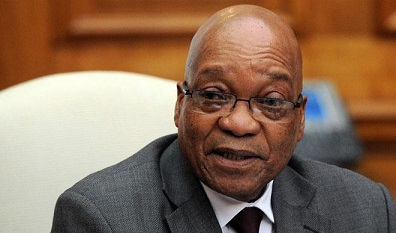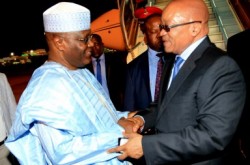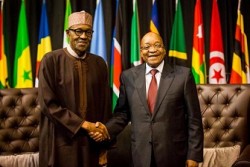Business
South African President Jacob Zuma addresses Nigeria’s National Assembly
Published
10 years agoon
By
Publisher
Address by His Excellency, President Jacob G Zuma, President of the Republic of South Africa, to the National Assembly of Nigeria, on the Occasion of His State Visit, Abuja, Nigeria on 8th of March 2016
Your Excellency, President Muhammadu Buhari, President of the Federal Republic of Nigeria;
Honourable Senator Olubukola Abubakar Saraki, President of the Senate;
Honourable Yakubu Dogara, Speaker of the House of Representatives;
Honourable Senator Ike Ekweremadu, Vice President of the Senate;
Honourable Yusuf Lasun, Deputy Speaker of the House of Representative;
Your Lordship Mahmud Mohammed, Chief Justice Supreme Court of Nigeria;
Honourable Ministers and Ministers of State in the National Executive Council of the Federal Republic;
Your Excellencies, the Governors of the States of the Federal Republic;
The Leadership of the Senate and the House of Representatives;
Distinguished Guests;
Fellow Africans,
Allow me first to convey the fraternal greetings and felicitations of the South African Parliament to this august House of the elected people’s representatives of the Federal Republic of Nigeria.
I also take this opportunity, to once more express my singular appreciation for the kind invitation extended to me by My Dear Brother and Friend, President Buhari to visit this great country.
Your invitation Mr President means a lot to us.
It tells a story of the need for our two sister countries to partner together not only to strengthen bilateral relations but also to partner together in pursuit of the continental integration, peace, security and development.
May I also express my profound gratitude for the honour bestowed to me to address the National Assembly of Nigeria.
We believe that this gesture indicates the seriousness with which the relations between South Africa and Nigeria are taken by this House.
Excellencies,
On a sad note, let me also take this opportunity to extend our deepest condolences on the passing of the Minister of State Labour of the Federal Republic of Nigeria.
Our thoughts are with the family, the government and people of Nigeria as you mourn this tragic loss.
Ladies and gentlemen,
Excellencies,
National Legislatures have come to play a pivotal role in the enhancement of bilateral relations between countries, evolving from their traditional roles of oversight of the executive and passage of legislation.
We are convinced that relations between the National Assembly of Nigeria and the Parliament of South Africa will grow into a cooperation that will enhance people-to-people exchanges.
We are also very pleased to stand here this afternoon in a building that symbolises democracy in Nigeria.
In 2015, the people of Nigeria proved Afro-pessimists wrong by the manner in which you conducted the elections, thus facilitating a democratic change of government.
We are incredibly proud of you as you in a profound way charted a way the entire continent needs to follow.
For that, we salute you and congratulate you once more.
Your Excellencies
This year marks the 40th Anniversary of the passing of one of the illustrious sons of Nigeria and Africa, General Murtala Mohammed. His tenure only lasted 200 days but it had a profound impact, particularly on the struggle against apartheid and colonialism in Southern Africa.
Nigeria supported the liberation struggles of the people of Southern Africa and South Africa specifically outside of the multilateral fora.
In his powerful speech to the OAU Extraordinary Summit on Angola in 1976, General Mohammed opened his address by saying and I quote:
“Mr Chairman, when I contemplate the evils of apartheid, my heart bleeds and I am sure the heart of every true blooded African bleeds.’
In conclusion General Mohammed said:
“Africa has come of age.” and will “no longer accept dictates from any so-called superpower.”
It was within this context that General Murtala Mohammed, immediately after the situation in Angola was explained to him, withdrew Nigeria’s support of the OAU position calling for a Government of National Unity between the FNLA of Holden Roberto, UNITA of Jonas Savimbi and the MPLA of Augostinho Neto.
He took a firm decision for Nigeria to support the MPLA, which resonated with the position of many liberation movements in Southern Africa, including our own – the African National Congress.
It is thus clear that ours are time-tested relations. Engagements between our countries far predate the formal relations established after South Africa attained its freedom.
The people of Nigeria provided unwavering support and solidarity to the people of South Africa, to unseat the last bastion of colonialism in Africa and enable us to attain our freedom.
I would like to remind especially the youth in our two countries, of the role that Nigeria played in the struggle for liberation in South Africa.
Nigeria was very instrumental in establishing, in the 1960s and the chairing, for 25 years, the United Nations Special Committee Against Apartheid, and further hosted a UN anti-apartheid conference in 1977.
From the mid-70s, Nigeria and its people also hosted some of the exiled freedom fighters from South Africa, with numbers increasing after the Soweto Student Uprising in 1976.
By coïncidence or design, this year we also commemorate the 40th anniversary of the Soweto Students Uprising in June 1976.
June 16 is this year commemorated as the International Day of the African Child since it was first instituted by the then Assembly Heads of State of the OAU in 1991.
It is within this context that our hearts and prayers are always with the Chibok Girls who were abducted from their dormitories in April 2014 by the terrorist group Boko Haram here in Nigeria.
We remain hopeful and trust that your efforts to find and rescue those children will bear positive results.
Ladies and gentlemen,
Indeed, Nigeria’s support to liberation struggles in Southern Africa has a special place in the history of the African continent.
Acting on principle and determination to root out colonialism and apartheid, Nigeria volunteered to be part of the Frontline States, a regional group of countries in Southern Africa that were in the frontline to fight apartheid.
Nigeria provided travel documents to South African Exiles en-route to different parts of the globe to solicit support for our course;
Furthermore, Nigeria established the Southern African Relief Fund in 1976 to provide scholarships and other assistance to South African students and refugees. Hundreds of South African students were also trained in Nigerian universities.
More importantly, Nigerian civil servants had a “Mandela Tax” deducted directly from their monthly salaries to support our struggle for liberation. This was a real selfless contribution to the cause of freedom and an end to apartheid colonialism in South Africa.
Nigeria also canvassed for and led a boycott of the Commonwealth Games within the Commonwealth Group of Nations, in 1978 and 1986.
The relations between the two countries are informed by this rich history, a history that needs to be told endlessly to current and future generations.
This history provided a context within which the establishment of formal bilateral relations in 1994 between the two countries was located.
 To manage these bilateral relations, our two sister countries established the Bi-National Commission (BNC) in 1999 and its inaugural session was held here in Abuja in October 1999 under the co-chairmanship respectively, of then Deputy President Jacob Zuma and then Vice-President Atiku Abubakar.
To manage these bilateral relations, our two sister countries established the Bi-National Commission (BNC) in 1999 and its inaugural session was held here in Abuja in October 1999 under the co-chairmanship respectively, of then Deputy President Jacob Zuma and then Vice-President Atiku Abubakar.
The main objective of the BNC is to lay a firm foundation for co-operation and partnership between the two countries within the broader objectives of the African Union and with the focus of bringing Africa into the mainstream of global political, social and economic developments, for example, the consolidation of the African Agenda.
Since the inaugural meeting of the BNC, eight sessions have been held with the 8th Session taking place on 23 May 2012 in South Africa.
A total of 34 Agreements and Memoranda of Understanding have been concluded since inception of the BNC, thus demonstrating the extent and depth of our bilateral cooperation.
While we appreciate the existence of so many agreements and memoranda of understanding, we would appreciate more if their implementation could be intensified for the mutual benefit of the respective countries.
We are happy that the bilateral economic relations between the two countries have significantly improved in the last 16 years as evidenced by the growing bilateral trade figures and investments.
More than one hundred and twenty South African companies operate in Nigeria currently, a huge growth from a mere four companies in 1999.
Nonetheless, there is room for greater business to business engagements particularly in the areas Nigeria has identified as potential growth sectors.
These include the diversification of the economy, namely electricity generation and supply, agriculture and agro-processing, tourism development including the hospitality sector, mining, banking, infrastructure development, aviation, manufacturing and the automotive sector.
We must strive for the diversification of our economies, so as to cast the net wide enough to create more job opportunities for our people, to improve their living conditions and grow our economies through domestic resources in the first instance.
In doing this, we would break away from the colonial legacy that turned Africa into providers of primary commodities and recipients of processed goods. This is important because the current state of affairs makes Africa vulnerable to the volatilities of the international economy that sustains the uneven terms of trade.
This diversification will go further to improve the impact that Africa can have in the global economy and to reconfigure the terms of trade.
We must strive to bring the manufacturing plants closer to the sources of raw materials. South Africa and Nigeria can to a large extent complement each other towards the achievement of this.
 The current global economic climate, as the previous global economic crisis, has exposed the vulnerability of our economies and currencies and thus calls for concerted efforts toward South-south and intra-Africa cooperation.
The current global economic climate, as the previous global economic crisis, has exposed the vulnerability of our economies and currencies and thus calls for concerted efforts toward South-south and intra-Africa cooperation.
Economic cooperation between our two countries can therefore serve as bedrock of the continent’s economic cooperation and intra-Africa trade. This is the kind of leadership Africa expects South Africa and Nigeria to provide.
In this regard, South Africa’s solid minerals mining experience can contribute to solid minerals exploration in Nigeria.
Our experience in electricity generation can also be tapped into, to assist in Nigeria’s electricity generation, to name but a few.
Also important is the need to improve people to people linkages.
The South African Airways direct flight route between Johannesburg and Abuja, which commenced operations on 26th January 2015, has added to the Johannesburg and Lagos route which has been operational for a good number of years now.
The route indicates the growing relations between our two countries.
It also provides potential to boost tourism both ways. It reduces travel time between Abuja and Pretoria for intergovernmental cooperation and boosts business engagements between the two countries.
Ladies and gentlemen,
The post 2015 development agenda, the Sustainable Development Goals (SDGs) need to be led from the front by collaboration between South Africa and Nigeria on behalf of Africa, considering that we are the biggest economies on the Continent.
We should strive not to be left behind in the fourth technological revolution.
We need to take into consideration the need to be sensitive to new environmental dynamics such as those of global warming and alternative energy sources.
Also important for us to take into account, is that the creation of a stable and peaceful environment in Africa is a prerequisite to attract more foreign direct investment to develop African Economies.
South Africa and Nigeria’s experience in the peaceful settlement of disputes, peace building and peace keeping missions is of utmost importance for progress in Africa.
In this regard South Africa has been re-elected into the AU Peace and Security Council at the recent AU Summit held in Addis Ababa in January this year.
We are ready to work with Nigeria to meaningfully feed into the work of the AU Peace and Security Council, for the good of our continent.
Your Excellencies,
South Africa and Nigeria are strategic partners in the pursuance of the African Agenda, South-South Cooperation and in the promotion of a rules-based International System.
Both countries share a common vision on issues of political and economic integration in Africa and on the need for a sustainable conflict resolution mechanism in Africa that is primarily driven by Africans.
At the global sphere, we share a common vision on the need for the reform of the multilateral institutions such as the United Nations particularly the UN Security Council.
We share the views about the reform of the international financial institutions, the IMF, the World Trade Organisation and the World Bank to be more reflective of the realities of the changed and changing international environment.
Our two countries must continue to advocate for rules-based-international system and must unite and work together in this regard, in order to achieve a more just and equal world.
Mr President and Honourable members of the Senate and House of Representatives;
Nigeria and South Africa must forge a strong strategic partnership.
We need to strengthen our political, economic social and cultural cooperation. We need to advance the continental integration and transformation informed by the African Union’s Constitutive Act.
We need to unite and work together on the issues of peace and security.
This should include the bringing into operation of the standby forces and their capacitation.
We commit ourselves to playing our part to achieve this.
Let the citizens of Africa march together to defeat all those forces that bring harm and suffering.
Let the citizens of the continent march together towards a brighter future, a future filled with prosperity and happiness.
South Africa and Nigeria, acting together in unity, must play a key role towards the achievement of these goals.
I Thank you
Trending

 Entertainment1 week ago
Entertainment1 week agoSinger Simi sparks debate after calling for death penalty for rapists

 Business1 week ago
Business1 week agoNaira mixed across markets as official window dips, parallel market strengthens

 Health1 week ago
Health1 week agoStudy suggests possible link between cell tower radiation and rising diabetes cases

 Business1 week ago
Business1 week agoNaira hits N1,337 against Dollar amid positive market sentiment

 Latest1 week ago
Latest1 week agoADC blasts APC over electoral act amendment, warns against ‘democratic backsliding’

 Entertainment1 week ago
Entertainment1 week agoTems, Burna Boy set new African record with most entries on Billboard hot 100

 Football1 week ago
Football1 week agoUCL Playoff: Gordon scores four as Newcastle thrash Qarabağ 6-1

 Entertainment5 days ago
Entertainment5 days agoSinger Simi faces backlash after TikToker admits to false rape allegation

